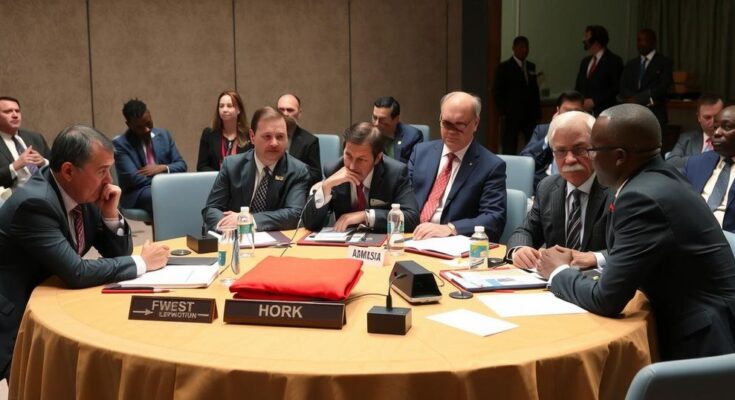The UN Security Council was informed about the ongoing violence in eastern DRC by Bintou Keita, highlighting the instability in North Kivu and Ituri provinces due to armed groups like ADF and M23. Keita commended regional efforts, particularly the Luanda process, and emphasized the need for continued international support. The humanitarian crisis worsens with millions displaced, alongside alarming rates of gender-based violence. Women’s voices for peace were underscored as crucial for future stability in the region.
On Monday, the UN Security Council was briefed by Bintou Keita, the UN Special Representative for the Democratic Republic of the Congo (DRC), regarding the current socio-political climate in the country, particularly the escalating violence in the eastern regions. The situation in North Kivu and Ituri provinces remains unstable, with several armed groups actively engaging in hostilities, prompting concerns for civilian safety. Ms. Keita applauded regional mediation efforts, specifically the Luanda process led by Angola, aimed at fostering dialogue and ending violence.
The upcoming leaders’ summit on December 15, involving Angola, the DRC, and Rwanda, represents a pivotal opportunity to highlight progress towards peace. Ms. Keita emphasized the necessity for international and regional support to ensure that local processes contribute to sustainable peace. Significant recommendations from various stakeholders, including women, during recent summits like the Nairobi process could enhance stability in the region.
In addition to security concerns, the DRC government is pursuing reforms to bolster governance and social services following last year’s elections. However, Ms. Keita urged all stakeholders to collaborate in addressing potential tensions surrounding constitutional revisions, thereby maintaining the country’s stability. She noted the recent advancements in the ceasefire agreement between the DRC and Rwanda, including the establishment of a monitoring mechanism for compliance.
The Security Council was informed about the persistence of armed groups such as M23 and ADF, who continue to pose grave threats to civilian populations, particularly in North Kivu. Although the violence level from other groups has decreased, there remains an urgent need for protection against attacks associated with the exploitation of natural resources, which fuels the conflict.
The prevailing security situation has exacerbated the humanitarian crisis in the DRC, with approximately 6.4 million individuals displaced due to ongoing conflicts. Notably, humanitarian funding efforts for 2024 have seen improvements, indicating a positive trend in addressing these crises. Furthermore, Ms. Keita reported over 90,000 cases of gender-based violence this year, reminding the Council of the urgent need for continued prevention efforts and accountability in combating such abuses.
In her closing remarks, Ms. Keita amplified the urgent calls from women and persons with disabilities for improved investments in their well-being. She noted their collective demand for lasting peace, emphasizing the necessity for all communities to return to their homes and schools in safety and dignity.
The Democratic Republic of the Congo has faced decades of conflict, exacerbated by political instability, ethnic tensions, and the struggle for control over rich natural resources. The eastern provinces, including North Kivu and Ituri, have become particularly volatile due to the presence of numerous armed groups, significant humanitarian crises, and the impact of climate change on local populations. International efforts, including the UN Stabilization Mission (MONUSCO) and regional initiatives such as the Luanda Process, aim to stabilize the region by fostering dialogue and addressing key issues that contribute to violence and instability. Recent political reforms in the DRC aim to enhance governance and social welfare, although challenges remain amid ongoing conflicts and socio-economic struggles in the country.
In conclusion, the UN Security Council remains actively engaged in the critical situation in eastern DRC, where violence perpetrated by armed groups poses a direct threat to civilian security and humanitarian well-being. Bintou Keita’s briefing underscored the importance of collaborative efforts among regional leaders and international stakeholders in promoting peace and stability. Despite encouraging advancements in governance and humanitarian response, the situation necessitates sustained attention and action to combat violence, support affected populations, and ensure lasting peace in the DRC.
Original Source: news.un.org



